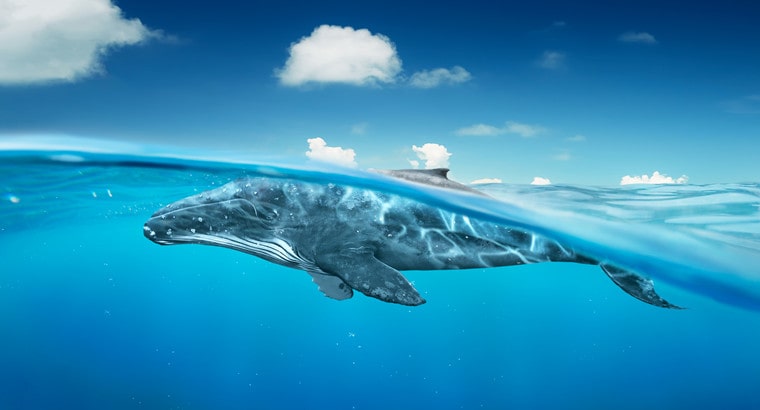The blue whale, the largest animal on the planet, is a fascinating and formidable creature that continues to captivate the interest of people worldwide.
In this blog post, we will be exploring 8 amazing facts about blue whales that will leave you in awe of their incredible nature. From their diet and vocalizations to their migration patterns and physical characteristics, we’ll reveal some of the most intriguing aspects of these ocean giants.
Whether you’re an avid whale watcher, marine biologist, or simply curious about the natural world, this post will offer you a fresh perspective on one of nature’s most magnificent and awe-inspiring creatures. Join us as we dive deep into the world of blue whales and discover some truly incredible facts about these amazing creatures that call our oceans home.
1. Blue whales are the largest animals on Earth
Blue whales are the largest animals on Earth. These majestic creatures can grow up to 100 feet long and weigh more than 200 tons. Despite their massive size, blue whales are graceful swimmers and travel great distances in search of food. They primarily feed on small shrimp-like creatures called krill, and they can consume up to 4 tons of krill in a single day.
Blue whales are also renowned for their unique vocalizations, which can be heard across vast distances. Their low-frequency calls can travel up to 1,000 miles underwater and are believed to help with communication and navigation. Blue whales are truly awe-inspiring creatures and a testament to the remarkable diversity of life on our planet.
2. Their hearts can weigh as much as a car
The average blue whale heart weighs around 400 pounds (180 kg) and is roughly the size of a small car. This is not surprising, given that these massive creatures can grow up to 100 feet (30 m) in length and weigh as much as 200 tons (181,436 kg).
To support such an enormous body, a blue whale’s heart has to be equally impressive. The heart is crucial to the whale’s ability to survive, pumping blood to its entire body and supporting its immense metabolic needs. The incredible size of the blue whale’s heart is just one of the many wonders of this magnificent ocean-dwelling creature.
3. Blue whales are filter feeders
Blue whales are classified as filter feeders, meaning they feed on small organisms like krill by filtering them out of large volumes of water. Using their baleen plates, which are made of keratin and hang from their upper jaws like a comb, they filter out the krill from the surrounding seawater as they swim.
These baleen plates can grow up to four meters long, and blue whales can consume up to 3,5000 kilograms (7,716 pounds) of krill in a day during feeding season. Despite their massive size, blue whales’ diet primarily consists of small organisms, which are abundant in the nutrient-rich oceanic seas where they live.
4. Their calls are the loudest sound made by any animal.
One of the most impressive features of the blue whale is the loudness of their calls. They can be heard up to 1,000 miles away and have been recorded as the loudest sound made by any animal. This low-frequency sound is produced by the whales to communicate with each other over long distances, and the intensity of the sound is believed to increase during mating season when the whales are searching for a mate.
This is a remarkable fact that highlights the incredible abilities of these magnificent creatures and the importance of preserving and protecting them for future generations.
5. Blue whales are solitary creatures
One of the most surprising facts about blue whales is that they are solitary creatures who typically travel alone or in small groups. This is in contrast to many other whale species that migrate and feed in larger groups. Blue whales are known to be highly independent and can often be seen swimming alone across vast stretches of the ocean. However, they may occasionally gather together in small groups or pairs during mating season or when feeding in particularly rich areas.
6. They can hold their breath for up to 30 minutes when diving for food.
Blue whales are truly remarkable creatures, and one of their most impressive abilities is their ability to hold their breath for up to 30 minutes while diving for food. The process of hunting for krill, the tiny shrimp-like crustaceans that make up the majority of their diet, requires immense lung capacity and efficient use of oxygen.
Blue whales are the largest animals on earth and can weigh as much as 200 tons. Their massive size means they require an enormous amount of energy to sustain themselves, and they rely on a combination of baleen filtration and lung capacity to catch their prey. When diving, they can reach depths of up to 330 feet, and in order to conserve oxygen during their dives, their heart rate can slow to just two beats per minute.
7. Blue whales are found in all of the world’s oceans, but their populations have been drastically reduced by whaling.
Blue whales are considered to be one of the most magnificent creatures on earth. They are the largest animals that have ever lived, measuring up to 100 feet and weighing as much as 200 tons. Another interesting fact about blue whales is that they are found in all of the world’s oceans. Despite their massive size, blue whales feed mainly on small crustaceans called krill.
Unfortunately, their populations have been drastically reduced by whaling. Even though it is illegal to hunt blue whales now, the effects of hunting have deteriorated their population to alarming levels. It is estimated that there are only around 10,000 to 25,000 blue whales left in the world. This highlights the importance of conservation efforts to protect blue whales and their habitats from further destruction.
8. Blue whales are surprisingly fast swimmers
Blue whales are the largest animals on our planet, but despite their size, they are surprisingly fast swimmers. In fact, blue whales can reach speeds of up to 30 miles per hour, making them one of the fastest marine mammals. The sheer size of blue whales might make one assume that they are slow swimmers, but this couldn’t be further from the truth. Their long, sleek bodies and powerful swimming abilities are what allow them to travel at such high velocities.
It’s important to note that although blue whales are fast swimmers, they can only sustain these speeds for short periods before needing to slow down and conserve their energy. Nonetheless, this impressive swimming ability is just one of the many amazing facts about blue whales that make them a fascinating species to study and admire.
In conclusion, the blue whale is a magnificent creature that continues to fascinate scientists and nature lovers alike. From their massive size to their unique vocalizations, there are many amazing facts to discover about these gentle giants of the sea. As we continue to study and learn more about blue whales, we can gain a greater appreciation for the complexity and beauty of the natural world.










